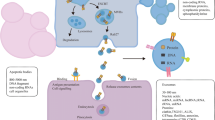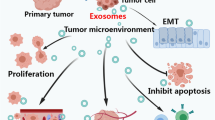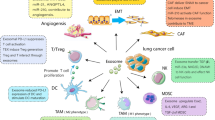Abstract
Lung cancer has been recognized as the leading cause of cancer-related death worldwide. Despite the improvements of treatment, the distant metastasis and recurrence of lung cancer caused by therapy resistance is the biggest challenge in clinical management. Extracellular vesicles named exosomes play crucial roles in intercellular communication as signaling mediators and are involved in tumor development. In this study, we isolated exosomes from irradiated lung cancer cells and co-cultured the exosomes with other lung cancer cells. It was found that cellular growth and motility of recipient cells were facilitated. High-throughput LC–MS/MS assay of exosomal proteins and Gene Ontology enrichment analyses indicated that the metabolic enzymes ALDOA and ALDH3A1 had potential contribution in exosome-enhanced motility of recipient cells, and clinical survival analysis demonstrated the close correlations between ALDOA or ALDH3A1 expression and poor prognosis of lung cancer patients. After co-culturing with exosomes derived from irradiated cancer cells, the expressions of these metabolic enzymes were elevated and the glycolytic activity was promoted in recipient cancer cells. In conclusion, our data suggested that exosomes from irradiated lung cancer cells regulated the motility of recipient cells by accelerating glycolytic process, where exosomal ALDOA and ALDH3A1 proteins were important signaling factors.





Similar content being viewed by others
References
Siegel RL, Miller KD, Jemal A (2019) Cancer statistics, 2019. CA Cancer J Clin 69:7–34
Reck M, Rabe KF (2017) Precision diagnosis and treatment for advanced non-small-cell lung cancer. N Engl J Med 377:849–861
Vinod SK (2015) International patterns of radiotherapy practice for non-small cell lung cancer. Semin Radiat Oncol 25:143–150
Kim W, Youn H, Kang C, Youn B (2015) Inflammation-induced radioresistance is mediated by ROS-dependent inactivation of protein phosphatase 1 in non-small cell lung cancer cells. Apoptosis 20:1242–1252
Youn H, Son B, Kim W et al (2015) Dissociation of MIF-rpS3 complex and sequential NF-kappaB activation is involved in IR-induced metastatic conversion of NSCLC. J Cell Biochem 116:2504–2516
Quail DF, Joyce JA (2013) Microenvironmental regulation of tumor progression and metastasis. Nat Med 19:1423–1437
Thery C (2011) Exosomes: secreted vesicles and intercellular communications. F1000 Biol Rep 3:15
Milane L, Singh A, Mattheolabakis G, Suresh M, Amiji MM (2015) Exosome mediated communication within the tumor microenvironment. J Control Release 219:278–294
Simons M, Raposo G (2009) Exosomes—vesicular carriers for intercellular communication. Curr Opin Cell Biol 21:575–581
Bobrie A, Colombo M, Raposo G, Thery C (2011) Exosome secretion: molecular mechanisms and roles in immune responses. Traffic 12:1659–1668
Colombo M, Raposo G, Thery C (2014) Biogenesis, secretion, and intercellular interactions of exosomes and other extracellular vesicles. Annu Rev Cell Dev Biol 30:255–289
Saleem SN, Abdel-Mageed AB (2015) Tumor-derived exosomes in oncogenic reprogramming and cancer progression. Cell Mol Life Sci 72:1–10
Whiteside TL (2016) Tumor-Derived Exosomes and Their Role in Cancer Progression. Adv Clin Chem 74:103–141
de Jong OG, Verhaar MC, Chen Y et al (2012) Cellular stress conditions are reflected in the protein and RNA content of endothelial cell-derived exosomes. J Extracell Vesicles. https://doi.org/10.3402/jev.v1i0.18396
Thery C, Amigorena S, Raposo G, Clayton A (2006) Isolation and characterization of exosomes from cell culture supernatants and biological fluids. Curr Protoc Cell Biol Chapter 3:3–22
Salic A, Mitchison TJ (2008) A chemical method for fast and sensitive detection of DNA synthesis in vivo. Proc Natl Acad Sci USA 105:2415–2420
Justus CR, Leffler N, Ruiz-Echevarria M, Yang LV (2014) In vitro cell migration and invasion assays. J Vis Exp 88:51046
Huang DW, Sherman BT, Lempicki RA (2009) Systematic and integrative analysis of large gene lists using DAVID bioinformatics resources. Nat Protoc 4:44–57
Szklarczyk D, Morris JH, Cook H et al (2017) The STRING database in 2017: quality-controlled protein-protein association networks, made broadly accessible. Nucleic Acids Res 45:D362–D368
Rhodes DR, Kalyana-Sundaram S, Mahavisno V et al (2007) Oncomine 3.0: genes, pathways, and networks in a collection of 18,000 cancer gene expression profiles. Neoplasia 9:166–180
Gyorffy B, Surowiak P, Budczies J, Lanczky A (2013) Online survival analysis software to assess the prognostic value of biomarkers using transcriptomic data in non-small-cell lung cancer. PLoS ONE 8:e82241
Kowal J, Tkach M, Thery C (2014) Biogenesis and secretion of exosomes. Curr Opin Cell Biol 29:116–125
Tkach M, Thery C (2016) Communication by extracellular vesicles: where we are and where we need to go. Cell 164:1226–1232
Stover EH, Konstantinopoulos PA, Matulonis UA, Swisher EM (2016) Biomarkers of response and resistance to dna repair targeted therapies. Clin Cancer Res 22:5651–5660
Tang L, Wei F, Wu Y et al (2018) Role of metabolism in cancer cell radioresistance and radiosensitization methods. J Exp Clin Cancer Res 37:87
Sun Y (2016) Tumor microenvironment and cancer therapy resistance. Cancer Lett 380:205–215
Yanez-Mo M, Siljander PR, Andreu Z et al (2015) Biological properties of extracellular vesicles and their physiological functions. J Extracell Vesicles 4:27066
Vander HM, DeBerardinis RJ (2017) Understanding the Intersections between metabolism and cancer biology. Cell 168:657–669
Hirschey MD, DeBerardinis RJ, Diehl A et al (2015) Dysregulated metabolism contributes to oncogenesis. Semin Cancer Biol 35(Suppl):S129–S150
DeBerardinis RJ, Chandel NS (2016) Fundamentals of cancer metabolism. Sci Adv 2:e1600200
Agathocleous M, Harris WA (2013) Metabolism in physiological cell proliferation and differentiation. Trends Cell Biol 23:484–492
Eelen G, de Zeeuw P, Simons M, Carmeliet P (2015) Endothelial cell metabolism in normal and diseased vasculature. Circ Res 116:1231–1244
Ji S, Zhang B, Liu J et al (2016) ALDOA functions as an oncogene in the highly metastatic pancreatic cancer. Cancer Lett 374:127–135
Chang YC, Chan YC, Chang WM et al (2017) Feedback regulation of ALDOA activates the HIF-1alpha/MMP9 axis to promote lung cancer progression. Cancer Lett 403:28–36
Chen X, Yang TT, Zhou Y et al (2014) Proteomic profiling of osteosarcoma cells identifies ALDOA and SULT1A3 as negative survival markers of human osteosarcoma. Mol Carcinog 53:138–144
Lessa RC, Campos AH, Freitas CE et al (2013) Identification of upregulated genes in oral squamous cell carcinomas. Head Neck 35:1475–1481
Hamaguchi T, Iizuka N, Tsunedomi R et al (2008) Glycolysis module activated by hypoxia-inducible factor 1alpha is related to the aggressive phenotype of hepatocellular carcinoma. Int J Oncol 33:725–731
Falck MM, Arunan V, Eykyn TR et al (2013) MEK1/2 inhibition decreases lactate in BRAF-driven human cancer cells. Cancer Res 73:4039–4049
Buzzai M, Bauer DE, Jones RG et al (2005) The glucose dependence of Akt-transformed cells can be reversed by pharmacologic activation of fatty acid beta-oxidation. Oncogene 24:4165–4173
Voulgaridou GP, Tsochantaridis I, Mantso T, Franco R, Panayiotidis MI, Pappa A (2017) Human aldehyde dehydrogenase 3A1 (ALDH3A1) exhibits chaperone-like function. Int J Biochem Cell Biol 89:16–24
Bertucci F, Salas S, Eysteries S et al (2004) Gene expression profiling of colon cancer by DNA microarrays and correlation with histoclinical parameters. Oncogene 23:1377–1391
Muzio G, Maggiora M, Paiuzzi E, Oraldi M, Canuto RA (2012) Aldehyde dehydrogenases and cell proliferation. Free Radic Biol Med 52:735–746
Black W, Chen Y, Matsumoto A et al (2012) Molecular mechanisms of ALDH3A1-mediated cellular protection against 4-hydroxy-2-nonenal. Free Radic Biol Med 52:1937–1944
Richards KE, Zeleniak AE, Fishel ML, Wu J, Littlepage LE, Hill R (2017) Cancer-associated fibroblast exosomes regulate survival and proliferation of pancreatic cancer cells. Oncogene 36:1770–1778
Li R, Wang Y, Zhang X et al (2019) Exosome-mediated secretion of LOXL4 promotes hepatocellular carcinoma cell invasion and metastasis. Mol Cancer 18:18
Zhang X, Shi H, Yuan X, Jiang P, Qian H, Xu W (2018) Tumor-derived exosomes induce N2 polarization of neutrophils to promote gastric cancer cell migration. Mol Cancer 17:146
Acknowledgements
This work was supported by the National Key R&D Program of China (No. 2017YFC0108604) and National Nature Science Foundation of China (Grant Nos. 31770910, 31570850, 81672985 and 11775052).
Author information
Authors and Affiliations
Contributions
CW, JX, DY and CS conceived and designed the experiments. CW and JX carried out the experiments and analyzed the data; DY, YB, YP and JZ assisted the experiments; CW and CS wrote the manuscript.
Corresponding author
Ethics declarations
Conflict of interest
The authors declare that they have no conflict of interest.
Additional information
Publisher's Note
Springer Nature remains neutral with regard to jurisdictional claims in published maps and institutional affiliations.
Rights and permissions
About this article
Cite this article
Wang, C., Xu, J., Yuan, D. et al. Exosomes carrying ALDOA and ALDH3A1 from irradiated lung cancer cells enhance migration and invasion of recipients by accelerating glycolysis. Mol Cell Biochem 469, 77–87 (2020). https://doi.org/10.1007/s11010-020-03729-3
Received:
Accepted:
Published:
Issue Date:
DOI: https://doi.org/10.1007/s11010-020-03729-3




